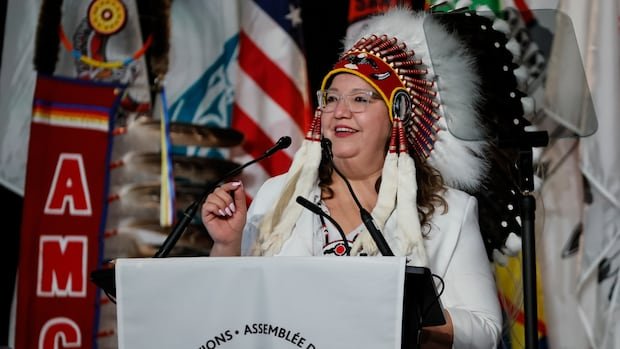First Nations leaders and representatives from various regions have convened in Winnipeg for the annual general assembly of the Assembly of First Nations (AFN) that commenced on Wednesday. The AFN, a prominent national advocacy group representing more than 600 First Nations, is hosting a three-day assembly where numerous chiefs and delegates will engage in discussions and adopt resolutions to guide the organization’s stance on critical topics like healthcare, education, environmental concerns, human rights, and preservation of language and culture.
The current agenda includes deliberations on matters such as First Nations policing, reforms in child welfare, strategies for reducing substance abuse harm, and the return of cultural artifacts. Notably, the chiefs are set to address Bill C-5 and the existing infrastructure gap affecting First Nations during the afternoon session on Wednesday.
Bill C-5, known as the Building Canada Act, grants the federal government authority to expedite approval processes for significant economic development ventures of national importance. While the government asserts that these modifications will spur economic advancement, many First Nations leaders caution that the streamlined procedures could sideline the obligation to consult with Indigenous communities, potentially infringing upon their rights.
In her opening remarks, AFN National Chief Cindy Woodhouse Nepinak emphasized the historical struggle to safeguard Indigenous rights, laws, lands, resources, and waters. Likewise, Assembly of Manitoba Chiefs Grand Chief Kyra Wilson stressed the importance of unity in upholding rights and responsibilities to the land amidst varying opinions on Bill C-5.
Moreover, the federal government recently announced the establishment of a Major Projects Office to facilitate the swift approval of projects under Bill C-5, including an Indigenous advisory council, with a commitment of $40 million to support Indigenous engagement in significant ventures. Crown-Indigenous Relations Minister Rebecca Alty emphasized the government’s aim to foster resilient economies through collaborative efforts with First Nations, emphasizing the necessity of meaningful consultations with impacted Indigenous peoples before proceeding with nation-building projects.
During the Economic Summit on Wednesday, Manitoba Premier Wab Kinew underscored the vital role of First Nations in nation-building and called for inclusive consultations to ensure project success. Additionally, Sen. Paul Prosper emphasized the importance of genuine engagement through the Indigenous advisory council, cautioning against tokenistic consultations.
Furthermore, AFN highlighted the urgent need to bridge the infrastructure gap in First Nations communities, estimating a $350 billion investment requirement by 2030 to deliver substantial socioeconomic benefits and job opportunities, countering the impact of external factors like trade tariffs.
Originally slated for July, the assembly was postponed due to wildfires that prompted evacuations in Manitoba, with hotel resources diverted to accommodate displaced residents. Manitoba Regional Chief Willie Moore acknowledged the wildfire-affected communities and urged attendees to keep their resilience in mind during the assembly proceedings.

